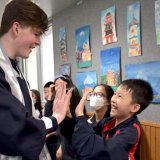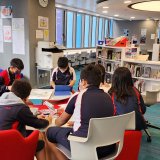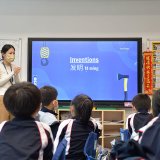What are the differences between the IBDP and A-Levels? Both offer admission to universities around the world; however, the programs have some very key differences.
The IB offers a broader structure to learning – There are six subject groupings. You must select one academic subject from each group:
Group 1: Language and literature
Group 2: Language acquisition
Group 3: Individuals and Societies
Group 4: Sciences
Group 5: Mathematics
Group 6: Arts or Electives – You can choose to study Music, Theatre or Visual Arts OR another language, another subject from Individuals and Societies or another science

Special Features:
- The Extended Essay – your child will craft a 4,000-word essay based on an original topic to ready them for university under the guidance of their advisor.
- Theory of knowledge – your child will develop their critical thinking skills and reflect on the nature of knowledge
- Flexible academic study options – The IB curriculum structure is broad so students don’t limit themselves should they change career paths. For example, even someone studying medicine could take biology, chemistry, and mathematics, literature, a language, and a social science subject. The IB curriculum enables students to take relevant courses for their future study plans but is also broad and flexible, to include course combinations according to their interests. The IB structure keeps multiple future options open, which is difficult to replicate in an A-level school.
- International Qualification– whether your child decided to study locally or globally, the IB Diploma is recognized worldwide by universities and employers.
- Learning beyond the classroom – to enhance your child’s personal and interpersonal skills, Creativity, Activity, and Service (CAS) involves taking part in over 150 hours of non-academic activity with a reflective writing component fully integrated into the program.
- Minimal grade inflation – The percentage of students achieving an IB Diploma each year has remained constant over the last decade which indicates that, unlike the A-Level, there has been little grade inflation. The IBDP is a consistent and standardized measure of student ach
- The Extended Essay – Students craft a 4,000-word essay based on an original topic to ready them for university studies under the guidance of their advisor.
- Theory of knowledge – Children develop their critical thinking skills and reflect on the nature of knowledge.
- Flexible academic study options – The IB curriculum structure is broad, so students don’t limit themselves should they change career paths. For example, even someone studying medicine could take biology, chemistry, mathematics, literature, a language, and a social science subject. The IB curriculum enables students to take relevant courses for their future study plans but is also broad and flexible, to include course combinations according to their interests. The IB structure keeps multiple future options open, which is difficult to replicate in an A-level school.
- International Qualification– The IB Diploma is recognized worldwide by universities and employers if your child decides to study locally or globally.
- Learning beyond the classroom – to enhance your child’s personal and interpersonal skills, Creativity, Activity, and Service (CAS) involves taking part in over 150 hours of non-academic activity with a reflective writing component fully integrated into the program.
- Minimal grade inflation – The percentage of students achieving an IB Diploma each year has remained constant over the last decade, which indicates that, unlike the A-Level, there has been noticeable grade inflation. The IBDP is a consistent and standardized measure of student achievement and results that can be relied upon as a measurement and compared year on year.
- ievement and results which can be relied upon as a measurement and compared year on year.

Why Study IBDP at 果冻传媒?
果冻传媒 School Hong Kong opened in Hong Kong in 2017, bringing 11 years of experience from our sister school in Singapore and a wealth of resources from the Cognita Schools group with over 80 schools worldwide.
In addition to our solid resources and curriculum, 果冻传媒 employs top international educators with an average of 12 years of experience who are experts in their subject of instruction.
Although 果冻传媒 is well-resourced with a full range of subject selections for our high school programs we are a close and caring community with small cohorts to ensure your child receives personalized support to achieve beyond their limits. As a non-IB selective school, we support all students who wish to pursue the IBDP*.
Our on-site University counselor will help guide you and your child through the crucial high-school years to enable them to access top schools worldwide, as seen in the results of 果冻传媒 Singapore.
- Small class sizes
- On-site counseling support team
- Wide range of Creativity, Activity and Service Experiences
- Focus on Innovation
- High-quality faculty with 10+ years of experience
- Part of the global Cognita schools group
- Non-IB selective to foster success for all students
Want to learn more?
You can learn more about what our parents think on where we are ranked #1 in the Best Schools in Hong Kong, #1 Best American School in Hong Kong and #1 Best IB Schools in Hong Kong.






